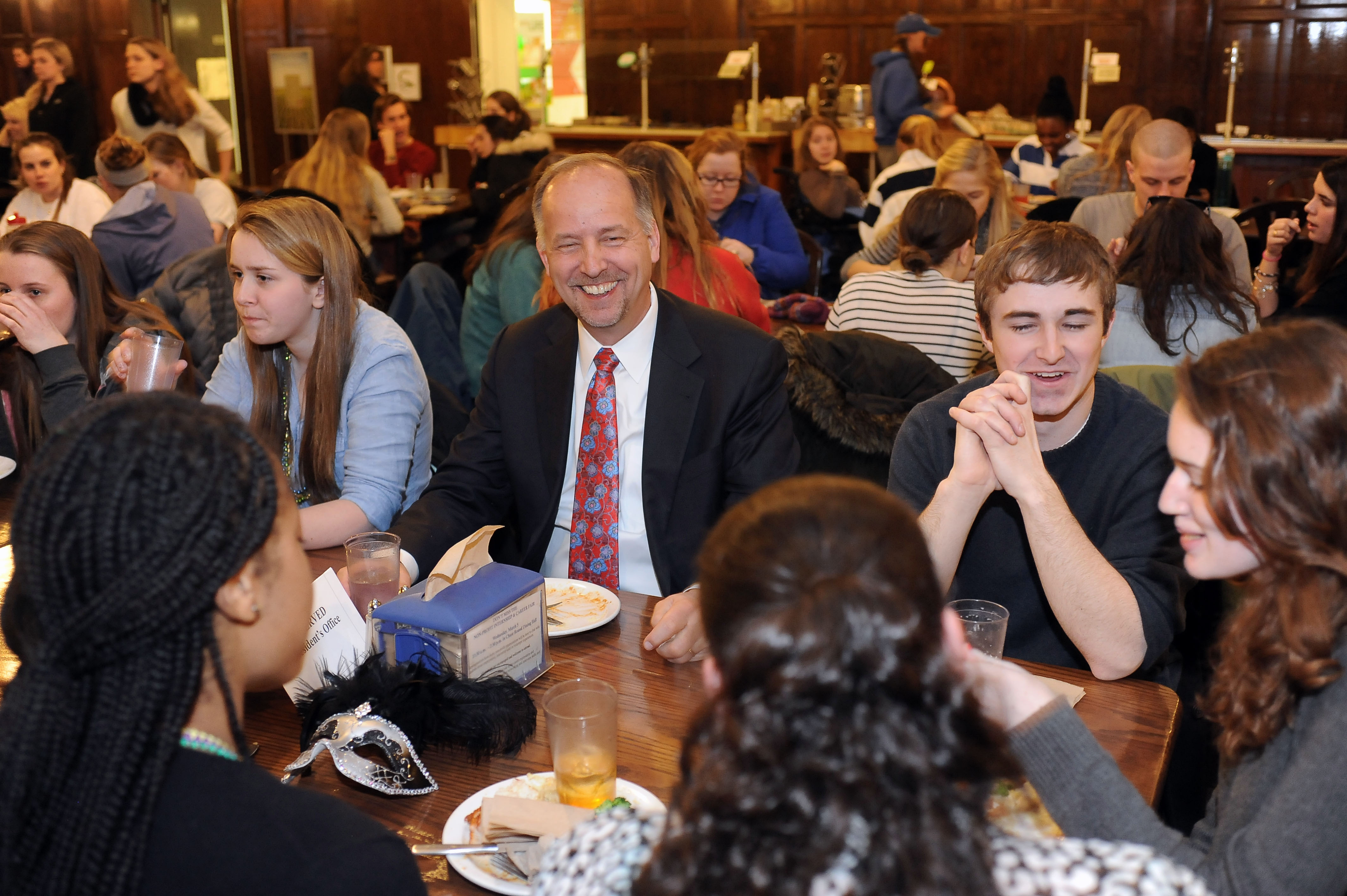
Dennis Hanno, the new president of Wheaton College, eats a meal with students. (Courtesy of Wheaton College).
Traditional colleges and universities face a host of challenges: rising costs, skyrocketing student debt and, increasingly, shifting demographics. In New England, the number of high school graduates will decrease in the next two decades, and at risk, higher ed experts say, are high-priced, four-year liberal-arts institutions, schools like Wheaton College in Norton, Massachusetts.
When Dennis Hanno was inaugurated this fall, he became Wheaton's eighth president, and he used his inauguration speech to justify the school's very existence.
"Let there be no doubt in anybody's mind, the world needs Wheaton College" Hanno declared. "While today some attack the value of a liberal arts education as being too deeply rooted in old technologies or not linked to specific career paths, I believe that there has never been a greater need for what we have at Wheaton."
On Campus recently sat down with President Hanno to discuss how he plans to lead the 180-year-old institution in these uncertain times.
CARAPEZZA: You grew up on a dairy farm in New York, you went to Notre Dame, then you became an accountant. Eventually you got into higher education and you became provost at Babson College. How did your previous experience prepare you for being president of Wheaton College?
HANNO: It's certainly not your typical path to the role of president at a college or university. But it's one that, when I reflect on it, there were consistencies throughout. It goes back to believing in the power of higher education and what it can do to transform lives and help people have an impact in their communities. When I came out of Notre Dame and had this focus on accounting, I realized that what I really liked was working with people. Then reflecting on "Okay, how can I take that and expand it to a whole set of other people who might want to do the same thing?"
CARAPEZZA: Colleges and universities are coming under a lot of fire for their inability to prepare graduates for the workforce. How do you plan to sell a liberal arts education?
HANNO: When I look at the graduates of today, absolutely you need to be ready to jump in to that workforce. So I think one way that liberal arts colleges can do that is by providing real-world opportunities for students to apply what they're learning as they're in college. And that's one thing we're doing at Wheaton through internships, research projects, and helping students build their own organizations and commercialized ventures.
CARAPEZZA: In today's environment though, where there is so much focus on job training, why do you think liberal arts is a really tough sell?
HANNO: It's really comforting for people to know that you have a 97 percent job placement rate. That's what everybody would like to say, that I'm going to get that instant return on my investment. But when you look at mid-career, humanities and social science majors have caught up with business and science majors in terms of their earnings. In fact, they're usually more engaged and happy with where they are then those who pursued more professional disciplines in college.
CARAPEZZA: Is it unfair to say that Wheaton's location in the suburbs of Boston affects your recruitment strategy?
HANNO: I actually think it could be an advantage. One of the opportunities it creates for us is that we end up having a 24/7 environment. Because we are on our own down there, one of the things we try to do is create a lively environment.
CARAPEZZA: What would you say to me if I were a parent thinking about a Wheaton education and spending a lot of money to send my kid to Norton, Massachusetts, and I'm worried that they're going to graduate with a mountain of debt, and no job.
HANNO: I'd start off with the statistics. Our students graduate with at, or slightly below, the Massachusetts average for debt. And finally we're going to provide those opportunities that students need to apply what they learn while they're there, so that they are well positioned to enter that workforce, find a great first job and then succeed in it.










